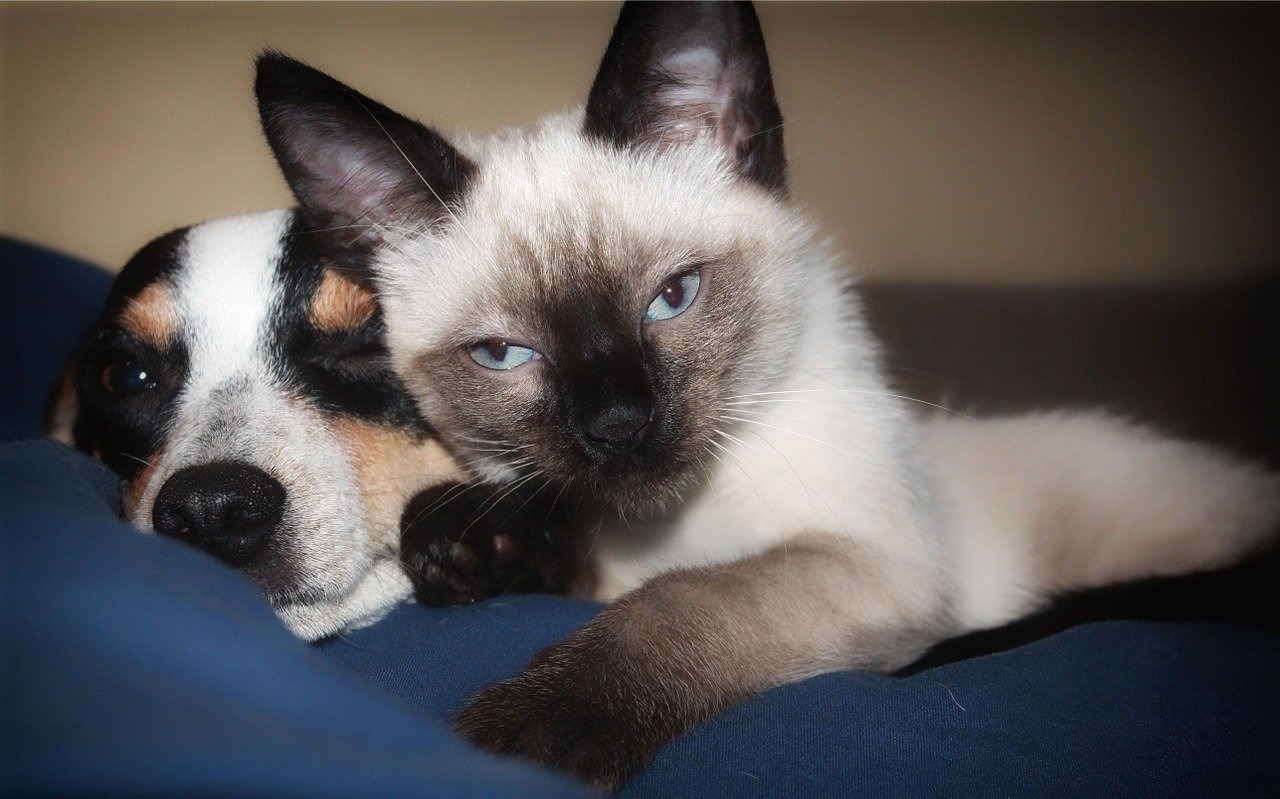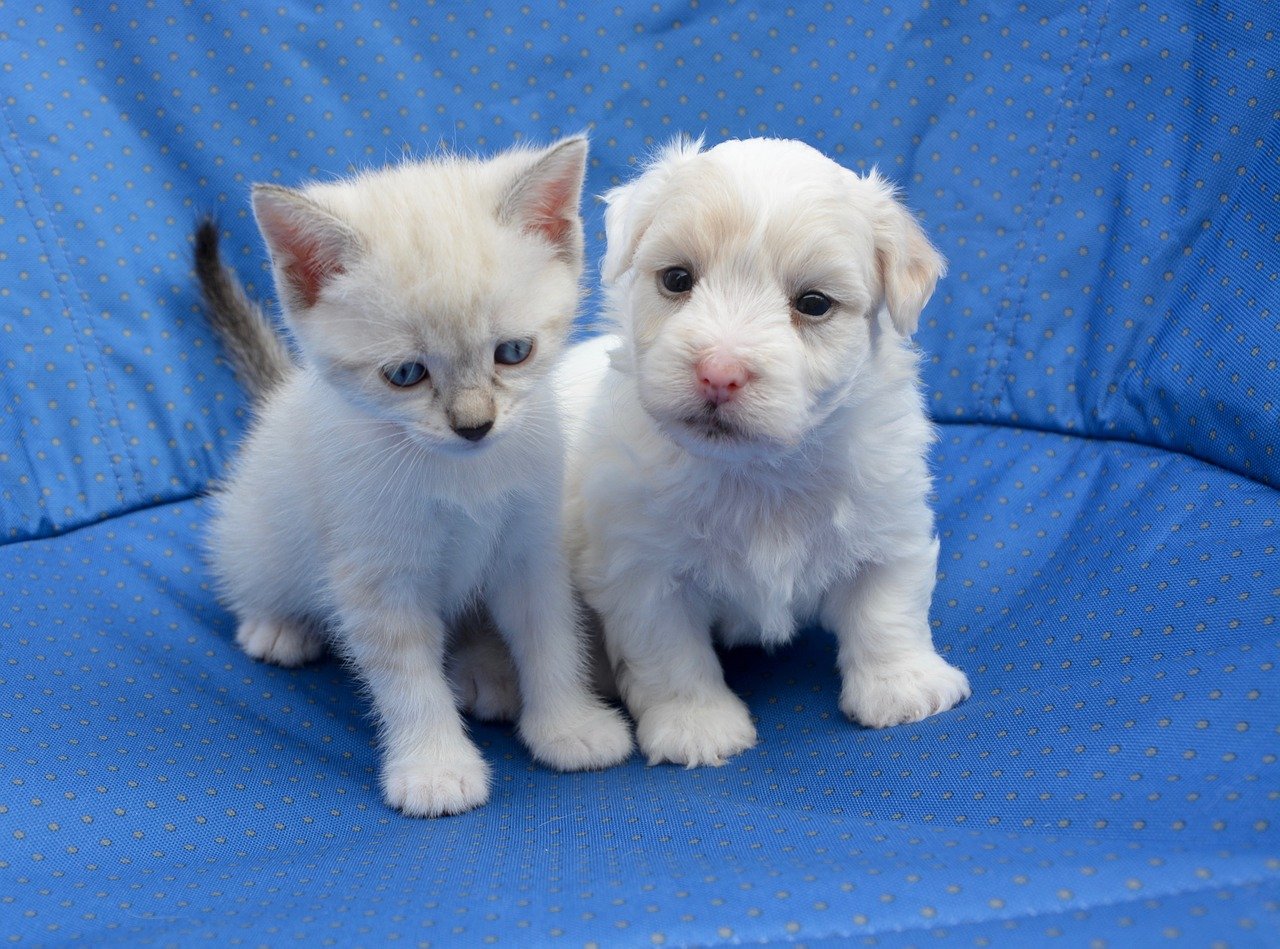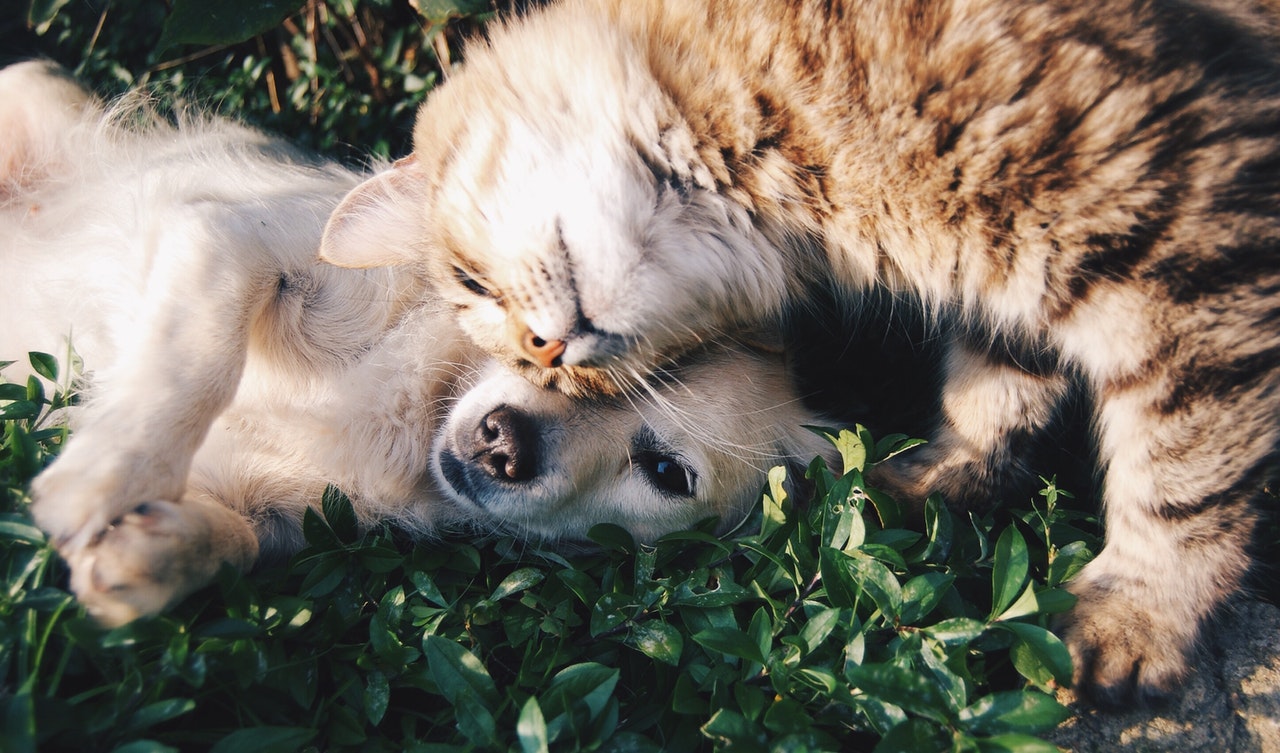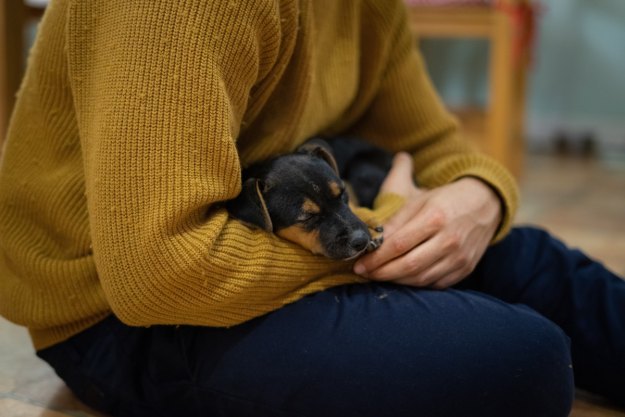Despite what films like Cats & Dogs want you to think, it is possible to find feline-friendly dog breeds capable of living peacefully with your cat. Some dogs, such as working breeds, were bred specifically to guard other animals. As a result, they instinctively protect their family members, including Mr. Whiskers. Similarly, many breeds were bred to work together in packs, making them friendly toward other dogs and even cats. Small dogs are also a great option, as they’re usually more concerned with demanding your attention than noticing what the family cat is doing.

Which dog breeds get along with cats?
While creating a peaceful household for your dog and cat definitely depends on the individual animals’ personalities, here are a few breeds that usually get along well with cats. Some of them might surprise you.
Golden retriever
According to the American Kennel Club, golden retrievers are the fourth most popular dog breed in America as of 2020. Known for their sweet dispositions and gentleness, it’s no surprise that goldens are among the best breeds if you have cats. Goldens are highly intelligent and eager to please, so you can easily train most goldens to accept your cat as a cherished member of the family. Goldens can be somewhat mischievous as puppies, so you might want to keep an eye on things if you have a particularly temperamental cat.
Newfoundland
Despite their massive size, these gentle giants are famous for their patient, laid-back demeanor. Newfies are playful as puppies, but they mellow into calm adults, so they shouldn’t frighten your cat. Because of their protective instincts, Newfies are a wonderful option if you have small children or other pets. Some cats may find their size intimidating, so we recommend keeping your fur babies apart until they’re more comfortable with each other.
Beagle
Classified as scent hounds, these entertaining, playful pups tend to get along with just about everyone. Beagles were originally bred to hunt in packs alongside horses, so the ability to get along with other animals is deeply ingrained in their genetic code. That being said, they might chase your cat due to an instinctive drive to flush out prey. Your beagle will probably think of it as a game, but your cat might not be too thrilled.
Poodle
Forget all the poodle stereotypes. They’re actually extremely clever and relatively easy to train. All three sizes — standard, miniature, and toy — can learn to live peacefully with cats, but the smaller sizes will be less intimidating for your feline friend. Toy poodles are affectionate and friendly, so it’s not uncommon for them to befriend their similarly sized cat family members.

Pug
If you’re looking for a dog that will bond with every member of the family, you should consider a pug. Small, happy-go-lucky, and just a bit lazy, pugs make ideal housemates for cats. Because of their laid-back personalities, they’re extremely unlikely to chase your cat around the house. Pugs are also extremely social puppers, so you’re likely to find your dog curled up beside your cat … as long as your cat doesn’t mind company.
Collie
Some herding breeds tend to be hyperactive and prone to herding members of their own family — cats included. However, collies are a sweet, gentle breed, and they’re a lot less excitable than most herding breeds. Collies make excellent family pets if you have other dogs, small children, and even cats. That being said, it’s possible that your collie won’t be able to resist the instinctive urge to herd the family. The good news is that they aren’t an aggressive breed, so they’re unlikely to snap at your cat.
Cavalier King Charles Spaniel
These adorable lapdogs will cuddle with anyone, including their new feline roommate. Their sweet demeanor makes them patient playmates for a cat, though they’ll pair best with a kitty who’s just as gentle. If not, Cavs are forgiving but consistent at standing their ground, so your feisty feline will get the idea to play nice sooner or later. Plus, how cute are these cat-sized cuddle bugs?
Labrador retriever
These mild-mannered pups are America’s most popular dog breed, according to the American Kennel Club. They’re known and loved for their sweet, athletic personalities that mesh well with many homes. This also makes them great friends for a cat, whether they’re lazy, curious, or downright crazy. Labs are also wonderful with training, so you know you’ll be in control when your cat and dog meet.
Irish setter
Many pet parents find Irish setters to be a lovable balance between dignified and rambunctious. They’ll go all-in during playtime, but they’ll be happy with some time to chill by themselves as well. Although they have a prey-hunting background, they’re generally friendly toward cats and small children because of their middle-of-the-line energy levels.
Corgi
These short and stout pups are superfriendly, which is just one reason why they’re so popular as pets. They’re alert, outgoing, and active, which many cats will find approachable. Because corgis need more stimulation than most dogs (via Purely Pets), a feline companion will help them stay calm and contained.
Pomeranian
Most Poms are actually smaller than your average cat, making them a fantastic choice for cat lovers. These little bundles of fluff are playful and personable, so they typically get along with every member of the family. One thing to note is their tendency to bark. If you have a particularly anxious cat that has issues with noise, you’ll need to train your Pom not to bark so your cat won’t stress out as much.

Breeds you’ll want to avoid
As much as we want our fur babies to get along, some dog breeds don’t play nicely with cats. Nordic breeds tend to have strong prey drives, which can be bad news for flighty felines. Energetic herding breeds like Australian cattle dogs might not give your cat a moment’s rest if the urge to herd the flock takes over. Some terriers are a bit too hyper, and because many terriers were bred to kill their prey, it’s better to be safe than sorry.
Taking the proper steps to introduce your pets goes a long way in creating a peaceful household. Use a favorite toy or blanket to allow your fur babies to get used to each other’s scent before you introduce them, and they’ll be more likely to accept the other animal as family. Opt for gentle, calm cats and dogs, and you’ll be amazed by how easily they can learn to live together.
Editors' Recommendations
- What is littermate syndrome? Why this puppy bond can be a problem
- How to find the right veterinarian for your pet
- Family member allergic to cats? Where to find hypoallergenic cats for adoption
- Meet the 5 newest dog breeds and what makes them so special
- When do kittens open their eyes? This is what happens if they do it too early




